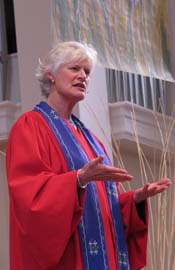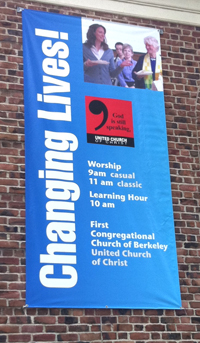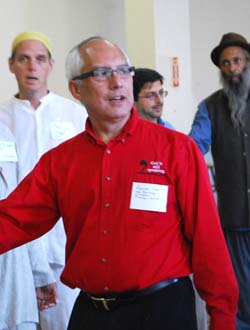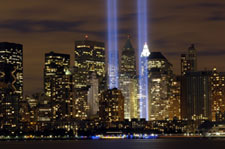by Phil Porter
Minister of Art & Communication
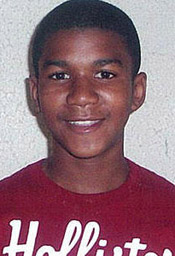 Last Sunday, a photograph of Trayvon Martin and a “hoodie” were placed on the communion tables at both services at First Church. Trayvon was a 17-year-old African American who was shot by a neighborhood watch captain in Florida. The man who shot Trayvon was not arrested based on his claim that he fired in self-defense. Public attention and outrage has grown steadily in the month since the shooting.
Last Sunday, a photograph of Trayvon Martin and a “hoodie” were placed on the communion tables at both services at First Church. Trayvon was a 17-year-old African American who was shot by a neighborhood watch captain in Florida. The man who shot Trayvon was not arrested based on his claim that he fired in self-defense. Public attention and outrage has grown steadily in the month since the shooting.
This case has touched a nerve for many, inviting us to look not only at instances, but at patterns. This situation is not just about the tragic death of one young man. It is about perceptions of young African American men. Though some may see the murder as out of the ordinary, many are seeing it as something that could easily happen to them or someone they love. Thousands upon thousands of parents are now even more concerned and apprehensive about the safety of their sons.
Philadelphia AP writer Jesse Washington talks about having to give his 12-year-old son the talk about the “black male code.” He gave his son this advice:
“Always pay close attention to your surroundings, son, especially if you are in an affluent neighborhood where black folks are few. Understand that even though you are not a criminal, some people might assume you are, especially if you are wearing certain clothes.
Never argue with police, but protect your dignity and take pride in humility. When confronted by someone with a badge or a gun, do not flee, fight, or put your hands anywhere other than up.
Please don’t assume, son, that all white people view you as a threat. America is better than that. Suspicion and bitterness can imprison you. But as a black male, you must go above and beyond to show strangers what type of person you really are.”
(Read Jesse Washington’s full article “Trayvon Martin, my son, and the Black Male Code”.)
Trayvon is both a victim and a symbol. The tragedy of his death stands alone, but as we mourn him, we are also mourning many lives lost. We have an opportunity to stop and call ourselves and our culture to account for the ways that young lives are cut short or derailed because of race or class.
One of the things that church can offer is a place where the family is extended. In so many ways, teenagers and their parents need the support of the wider community. We can help hold the lives of our young people during a period that is often fraught with challenge. Perhaps Trayvon’s death can spur us to take even more seriously our opportunity to spread our collective wings over our young ones—those right next to us, those we pass on the street and those we only hear about through the news.

